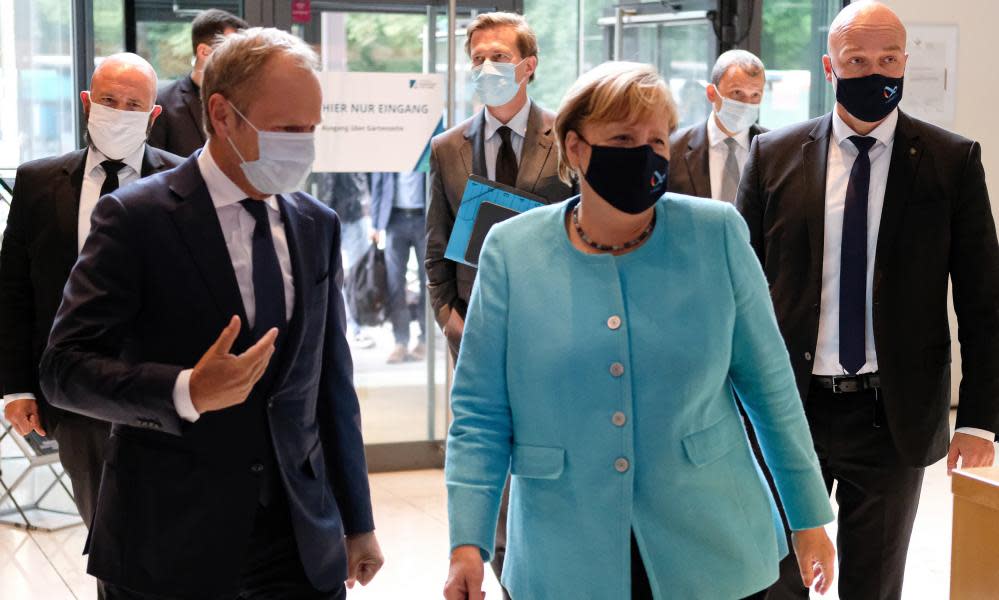Brexit was no aberration. The European Union needs to learn from it

In fewer than 100 days, Brexit will have been completed. Britain will be outside the European Union customs union and the internal market. But Brexit poses questions for the EU as well as for Britain. It challenges what might be called the ideology of Europe. It is, after all, a serious matter for a democratic organisation when a major member state decides to leave.
“It would,” declared Donald Tusk, then president of the European council, shortly after the Brexit referendum in 2016, “be a fatal error to assume that the negative result in the UK referendum represents a specifically British issue … the Brexit vote is a desperate attempt to answer the questions that millions of Europeans ask themselves daily.”
President Macron of France was honest enough to confess to the BBC’s Andrew Marr early in 2018 that it was possible a referendum in France could even have yielded the same result as in Britain.
What, then, are the lessons? In her Bruges lecture of 2010 (as important as Margaret Thatcher’s lecture of 1988, though less noticed) German chancellor Angela Merkel pointed to a continual and creative tension between two Europes – supranational Europe and intergovernmental Europe. If that tension is disturbed, and supranational policies intrude upon national identities, there will be popular resistance.
The problems sparked by migration and the euro show in graphic form how the EU can arouse such resistance, if it goes beyond what is acceptable by seeming to challenge the national identity of member states.
The strong executive action needed to resolve the euro and migration crises could only be taken by national governments working together. These crises were confronted primarily by the governments of the member states in the European council: the commission and the European parliament played a distinctly secondary role.
The Covid crisis, like past crises, is leading to talk of further integration. Some EU leaders seek new economic and budgetary instruments culminating in fiscal union so as to place the euro on stronger foundations. But with fiscal union, what issues would be left for national elections and national governments when so much economic policy has been removed from the agenda?
Further integration, let alone treaty amendment, is the last thing Europe needs. For supranationalism is now a threat to the fulfilment of the European ideal, not a facilitator of it.
As long ago as 1990, when Jacques Delors, former president of the commission, told the European parliament that he wanted Europe to become a “true federation” by the end of the millennium, the then French president François Mitterrand, watching on television, burst out: “But that’s ridiculous! What’s he up to? No one in Europe will ever want that. By playing the extremist, he’s going to wreck what’s achievable.”
Few in Europe seek to submerge their country’s national identity in a federation. Instead, they seek to pursue their own national interests constructively within a co-operative European framework. Perhaps Britain should have done the same.
There is, paradoxically, a sense in which Brexit Britain, together with Gaullist France, were in the vanguard of European development, rather than hindrances to it. For both appreciated – Britain, thanks to its long evolutionary history, and the Gaullists as a result of France’s experiences during the war – what the sacrifice of sovereignty would actually mean in practice.
When, in the 1990s, prime minister John Major declared that Europe was not yet ready for a common currency, his warnings were ignored and he was regarded as an obfuscator. But perhaps the other member states should have heeded what he said. That would certainly be the view of those young people in the Mediterranean member states who find themselves unemployed as a result of the austerity policies caused by the euro.
For those member states emerging from dictatorships, it was easy to say, rhetorically, that they were eager to sacrifice sovereignty. But all of them found their acceptance of shared sovereignty was subject to very strict limits: Germany, when it came to sharing debts; Greece, when it came to budgetary restrictions; and the Visegrad countries of central Europe (the Czech Republic, Hungary, Poland and Slovakia), when it came to accepting a due quota of Syrian migrants.
What Europe needs, as Tusk frequently pointed out, is not more Europe but better Europe – practical improvements, such as completion of the European services market. Services, after all, make up 70% of economic activity in the EU, but there are still about 5,000 protected professions.
Europe also needs a digital single market, which Mark Rutte, prime minister of the Netherlands, has calculated would add €400bn (£370bn) to Europe’s GDP.
The EU, then, must remain primarily an intergovernmental institution in which the member states, through the European council, dictate the pace of change. But such a Europe of states would be an intergovernmental organisation with a difference, since member states would be considering not only their own national interests but the interests of the whole continent.
Europe has suffered in the past from the absence of such a perspective. Had it been there in 1914, had national governments considered the interests of Europe as a whole rather than merely their own national interests, war would have been avoided.
Brexit, then, was not an aberration. Instead of applauding or condemning it – for, after all, Brexit is yesterday’s argument – the EU must seek to learn its lessons.
• Vernon Bogdanor is professor of government at King’s College London, and author of Britain and Europe in a Troubled World


